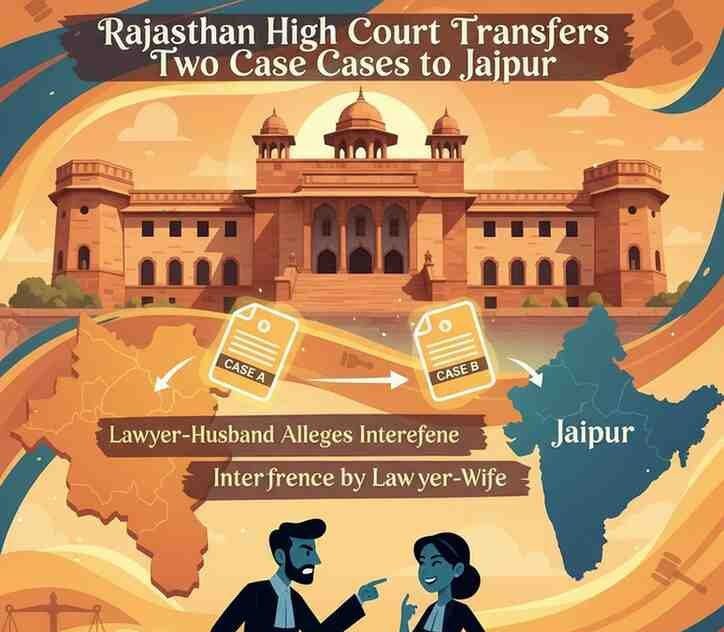Rajasthan High Court Transfers Two Cases to Jaipur After Lawyer-Husband Alleges Interference by Lawyer-Wife:
The Rajasthan High Court has shifted two ongoing cases from Sawai Madhopur to Jaipur after a lawyer claimed his wife—also a practising lawyer—was interfering with his legal representation. Learn the full details, background, and implications of this decision.
Background of the Case
The Rajasthan High Court recently addressed an unusual situation involving a married couple, both of whom are practising lawyers. The husband alleged that his wife was actively interfering with his legal defence in two cases pending before the Sawai Madhopur courts.
According to the husband, his wife had been attempting to influence his counsel and even pressured local lawyers not to represent him. He further claimed that the local Bar Association issued notices to his lawyers, which were later withdrawn on the same day. Feeling that his right to a fair trial had been compromised, he requested that the cases be transferred to another district.
Court’s Observations
The High Court emphasised that every litigant is entitled to fair and unbiased legal proceedings, and no party should be allowed to obstruct the other’s representation. The Court noted that the courtroom is a “temple of justice” where no external influence—professional or personal—should interfere with the judicial process.
After reviewing the facts, the Rajasthan High Court concluded that the husband’s concerns were legitimate and that continuing the proceedings in Sawai Madhopur might not ensure impartiality. Therefore, it ordered the transfer of both cases to Jaipur for further hearing.
However, the Court clarified that this transfer does not nullify prior court orders. The husband remains obligated to pay ₹15,000 per month in maintenance to his wife, as ordered earlier.
Key Reasons for the Transfer
Protection of Fair Trial
The husband’s allegation of professional interference raised serious concerns about his ability to receive a fair hearing in Sawai Madhopur.
Ensuring Independence of Counsel
The Court acknowledged that lawyers must be free to represent their clients without intimidation or pressure from any party involved in the case.
Maintaining Judicial Neutrality
By transferring the cases to Jaipur, the High Court aimed to remove the potential influence of local legal circles and maintain the neutrality of the judicial process.
Legal and Social Implications
- The ruling reinforces the importance of fairness and impartiality in matrimonial and professional disputes.
- It highlights that even when both spouses are part of the legal community, professional ethics and court independence must be preserved.
- The case also underscores that transfer petitions may be justified when one party’s actions appear to obstruct the other’s access to justice.
FAQs
What led to the case transfer?
The husband, a practising lawyer, alleged that his wife—also a lawyer—was interfering with his legal representation and influencing local advocates against him
Which court issued the transfer order?
The Rajasthan High Court issued the order, moving the cases from Sawai Madhopur to Jaipur.
Conclusion
The Rajasthan High Court’s decision to move two cases to Jaipur serves as a reminder that fairness in legal proceedings outweighs personal or professional rivalries. By protecting a litigant’s right to unbiased representation, the Court has reaffirmed its commitment to upholding the integrity and independence of the judicial system.

























